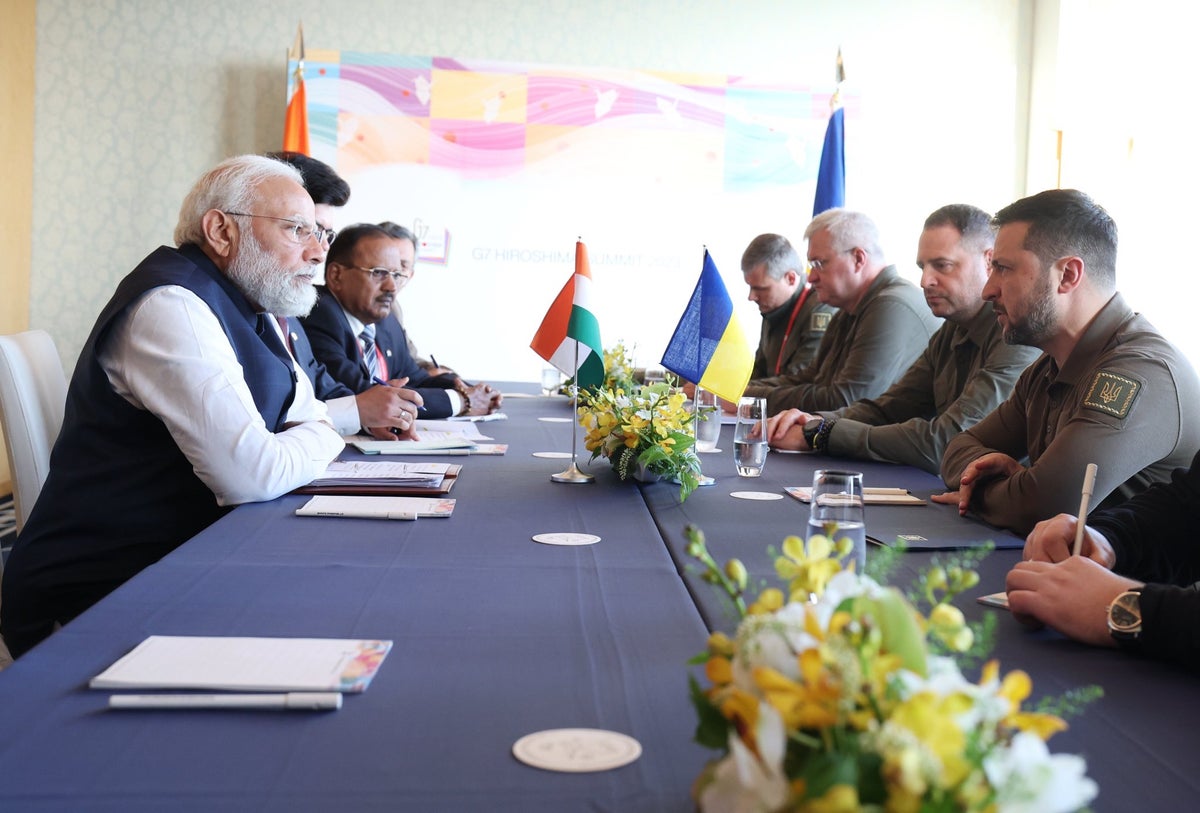
Indian prime minister Narendra Modi has assured Ukrainian president Volodymyr Zelensky of “whatever is possible” to find a solution to bring an end to the continuing war amid Russia’s full-scale invasion as the two leaders met in Hiroshima along the sidelines of the G7 summit.
“Over the past one-and-a-half years, we have spoken on the phone but… after a long time, we have an opportunity to meet. The war in Ukraine is a very big issue for the whole world. It has had many different impacts on the whole world,” Mr Modi told the Ukrainian president as the two leaders sat down for their first face-to-face talks with their delegation on Saturday.
Mr Modi added: “… But I don’t see this as a political or economic issue, for me this is an issue of humanity, an issue of human values.”
“You know more than any of us what is the suffering of war,” he told the Ukrainian delegation.
The Indian leader cited the experience of Indian students who returned from the war-hit nation after the full-scale invasion began and said that their “description of the circumstances” shared by them made the prime minister “understand the pain felt” by Mr Zelensky and the Ukrainian citizens.
“I wish to assure you that India and I, in my personal capacity, will do whatever is possible to find a solution to this (conflict),” Mr Modi said on Saturday.
The Ukrainian president also briefed Mr Modi on Ukraine’s peace plan under which the besieged nation has demanded a complete withdrawal of Russian troops from the country before proceeding to sit for negotiations and peace talks.
“Had a meeting with [the] prime minister of India… in Japan. I briefed the interlocutor in detail on the Ukrainian peace formula initiative and invited India to join its implementation. I spoke about Ukraine’s needs in humanitarian demining and mobile hospitals,” Mr Zelensky said in a tweet shortly after.
“I thank India for supporting our country’s territorial integrity and sovereignty, in particular, at the platforms of international organisations, and for providing humanitarian aid to Ukraine,” he added.
However, the statement shared by New Delhi did not mention backing Ukraine’s territorial integrity and sovereignty.
“PM said that India will continue to provide humanitarian assistance to the people of Ukraine. President Zelensky briefed the PM on the current situation in Ukraine. Both sides agreed to remain in touch,” a statement by the ministry of external affairs said, adding that Mr Modi lauded Ukraine’s cooperation in the safe evacuation of Indian students and welcomed Kyiv’s decisions to hold exams in India for students.
More than 17,000 Indians, including mostly students, were evacuated from Ukraine in February last year after the full-scale invasion started on 24 February. Ukraine was a popular choice for several Indian medical students who had to seek transfer to universities in other nations to resume their higher studies.
Both leaders, Mr Zelensky and Mr Modi, have spoken to each other four times over phone after the Russian invasion but this was the first in-person meeting.
A top ally of Russia in terms of defence imports, India’s position on the continuing war has been criticised for not backing Ukraine. India has abstained at least six times at the United Nations General Assembly voting held for condemning the Russian invasion over its 15-month course, with the latest abstention recorded in February this year.
Additionally, India has emerged as the largest buyer of Russian oil from almost negligible imports before the war. Russia diverted a majority of its oil exports to its Asian allies, India and China, at discounted rates after Western sanctions plugged the Kremlin’s huge earnings from the oil trade.
The G7 summit has offered the chance for fence-sitting nations to have a direct channel to rally for supporting Ukraine in the invasion.
It was an opportunity to convince big emerging states such as India and Brazil to come off the fence and put their support behind Ukraine, said French president Emmanuel Macron.
He made the comment to reporters a day after calling Mr Zelensky’s surprise visit at the summit a “game changer”.







